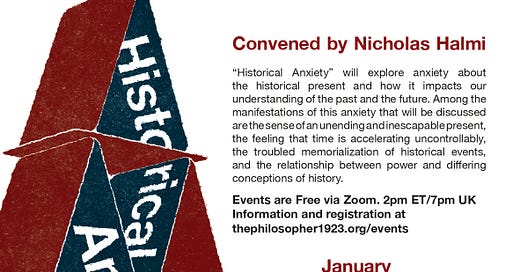On Misanthropy; Temporalities in Conflict
An interview with Ian James Kidd; an event with Stefanos Geroulanos
Dear all,
Before we launched out “On Philosophy” digital events series back in autumn 2020, I did a “trial run” event with Ian James Kidd - partly to see if I could work out how to use Zoom, partly because Ian was generous enough to agree to do a small event with only a few invited people in attendance. The topic was Ian’s interest in philosophical misanthropy, and the topic certainly feels timely 4+ years on. Would that it were not so, but Ian’s definition of misanthropy as “the systematic condemnation of the moral character of humankind as it has come to be” seems to ring true. You can find the link to the transcript of our conversation below. This week, we are also hosting the third event in Nicholas Halmi’s “Historical Anxiety” series, with NYU-based intellectual historian Stefanos Geroulanos discussing “Temporalities in Conflict”. Geroulanos is an extremely engaging speaker, so it promises to be another excellent event.
Your Sunday Read
“Why Misanthropy?”
a conversation with Ian James Kidd
Misanthropy – the moral condemnation of humankind – is very topical these days. There are many inspirations for a sense of the collective awfulness of humankind, from the failures to act on the global environmental crisis to the rise of far-right ideologies to the avoidable mass suffering of billions of humans and animals. But philosophers rarely talk about misanthropy as a doctrine. When they do, it is usually narrowly defined as a hatred of human beings or coupled to extreme proposals. In this conversation, Ian James Kidd offers an overview of philosophical misanthropy, including his own definition (“the systematic condemnation of the moral character of humankind as it has come to be”), addresses some common misconceptions, considers the shortcomings of Rutger Bregman’s “Homo puppy” brand of optimism, and clarifies how – and why – one may wish to be a misanthrope. You can read the conversation here.
Monday Event: 11am PT/2pm ET/7pm UK/8pm CET
“Temporalities in Conflict”
Stefanos Geroulanos with Nicholas Halmi and Andrés Saenz de Sicilia
In recent years, concepts and metaphors of temporal disorder or paradox (“arrhythmia”, “crisis”, “heterochrony”, the “nonsimultaneity of the simultaneous”) have become more central to the study of historical time. Yet they are seen as exceptional occasions, and the language of “multiple temporalities” remains dominant. In this event, Stefanos Geroulanos will discuss the necessity of moving to a more dynamic and conflictual understanding of time, the effect this has on spatial and temporal metaphors, and how temporal conflict may be reconciled with a basic phenomenological or empirical sense of temporal continuity. You can find out more and register here.
Historical Anxiety: Event Recordings
You can watch the recordings of the previous two events in the “Historical Anxiety” series here and here.
Ending
The Philosopher is unfunded and relies on your support to keep doing the work we do. Through becoming a supporter via Patreon, you can get all our print/digital issues sent to you, enjoy priority access and discounted rates for our groups/classes, join philosophical discussions with our editorial team, and more. The income we generate via Patreon helps us to keep our events series free and to pay our contributors. You can find out more and become a member here.
Wishing you all a lovely Sunday, wherever you are.
Anthony Morgan
Managing Editor




